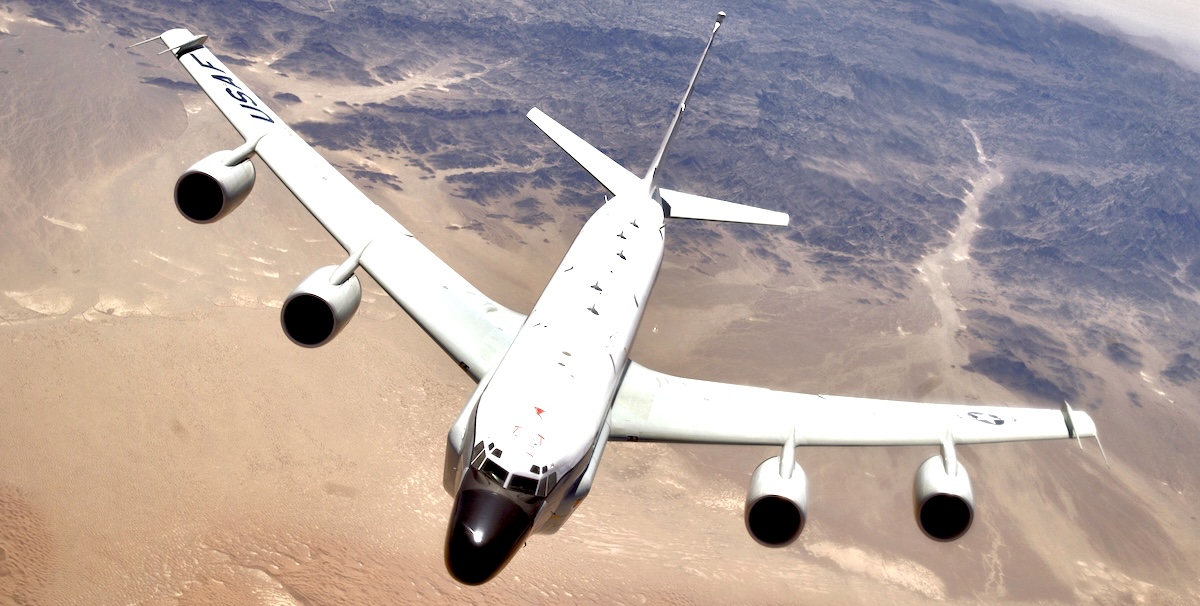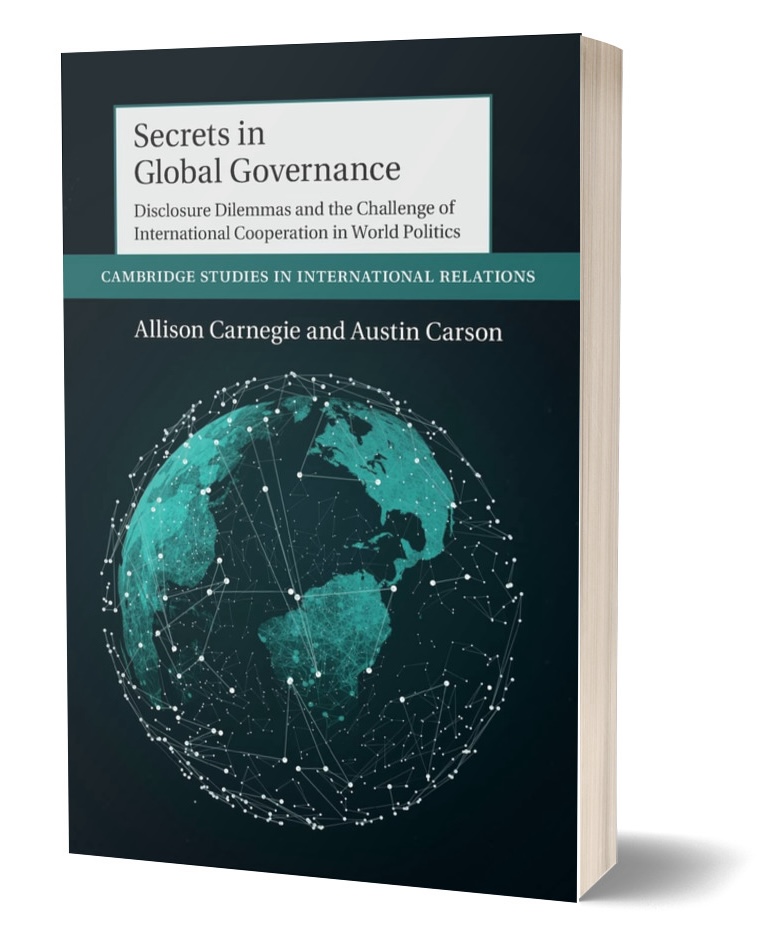Secrets in Global Governance: Disclosure Dilemmas and the Challenge of International Cooperation by Allison Carnegie, Austin Carson
Summary and takeaways from the book.
Keywords:
Informed
Deep State
Nov 16, 2023

USAF RC-135V/W Rivet Joint
The RC-135 is used for
near real time on-scene intelligence collection, analysis.
"the RC-135 fleet has also participated in every sizable armed conflict involving U.S. assets during its tenure."
International Organizations play part in international governance and co-operation.
They act as a trusted common entity in conflict resolution where its technical experts verify accusations without sharing sensitive data with anyone.
Considerable practical challenges remain and are discussed in the book.

ISBN: 9781108745949
Published: July 23, 2020
Pages: 362
Available on:
amazon
"
Secrecy in international politics is as old as state sovereignty itself". Yet states need to share sensitive and confidential data without revealing sources to jeopardize future operations.
Accusations between nations and multi-national corporations "
without providing details about sources and methods... will have minimal political impact because claims that are provided without evidence lack credibility."
"
Assembling evidence of violations of international laws and norms is difficult, yet without it, international efforts to give teeth to cooperative agreements fall short."
International Organizations play part in international governance and co-operation. They act as a trusted common entity in conflict resolution where its technical experts verify accusations without sharing sensitive data with anyone. All member states can then trust the information without knowing the details.
Such International Organizations have value in prosecuting international war crimes, trade disputes, and International Atomic energy regulation.
It is vital that International Organizations "
vet the details[of accusations] and lack direct political or economic incentives to misrepresent the information". Otherwise they will not be trusted.
The book has several examples where International Organizations have been used as trusted middleman by nations and commercial entities to resolve issues.
Considerable practical challenges remain and are discussed in the book.
Sharing secret information and sources
Book has examples of the Cuban Missle crisis in 1963 where U2 spy plane took photos of Soviet missiles in Cuba. USA had to reveal pictures and its sources to give credibility to its accusations.
"
US intelligence was goaded into revealing so much about its workings, from initial collection through analysis to the part it played in policy decisions, that the Soviets will know exactly what mistakes to avoid in the future."
"
This study reaches the obvious conclusion that U.S. intelligence collection ability has been impaired by these disclosures."
Role in international free trade
How does a corporation in a country know its competitor in another country is not being unfairly supported by subsidies or another means by the government of that country. Without this level of trust, international free trade agreements will be bypassed.
Author gives example of trade dispute between two aviation companies - Embraer in Brazil and Bombardier in Canada. Embraer suspected Canadian government of financially supporting Bombardier in violation of WTO rules.
"
In 1998, Brazil brought a case – referred to as Canada – Aircraft (DS 70) – to the WTO in which it alleged that the Canadian government had illegally provided financial support to its domestic civil aircraft industry."
Maintaining secrecy and confidentiality of commercial documents submitted to WTO complicated the case. The reader is encouraged to read the book for more details.
Role in international law and prosecuting war crimes
Governments collect
Signals Intelligence(SIGINT) and intelligence through other channels wherever they can.
"
Governments collect this information in part because they typically monitor other states through clandestine means, particularly when those countries host active hostilities with geopolitical, security, humanitarian, and economic implications for third parties".
Authors discuss case of Serbian leader Slobodan Miloševic and the war crimes following Yugoslavia’s breakup. International Criminal Tribunal for the Former Yugoslavia(ICTY) was setup for this.
There are legal complications as well with who gets to see secret information collected by a third party or country. Defendents have right to review and cross-examine evidence. It is not know how this will work if the nations sharing sensitive information want confidentiality of the evidence.
"
defendants right to see the evidence used against them in court – one common element of due process – is in direct tension with confidentiality measures".
So, even with the secrecy and confidentiality provided by International Organizations, the evidence ultimately has to be shown for legitimacy to defendants lawyers and the defendants when prosecuting in a court of law. Without this, the International Organization stands accused of accusations of running a
Kangaroo Court.
States that share evidence have to make this decision whether to share evidence potentially revealing their sources, or not. The decision is driven by "
adaptation costs". Exposing their methods will mean that intelligence gathering methods have to be
adapted to be effective in the future. Is it worth it?
"
When choosing whether to make it available, however, such states often face a difficult trade-off because they must weigh the incrimination benefits against the adaptations costs associated with providing it."
The book has examples where even just the knowledge of being under surveillance led to change in tactics by Serbian army, and Rwandan military.
In case of Slobodan Miloševic, "
growing chorus of support for judicial accountability", "administration felt intense domestic pressure from the constant images of the carnage in the US domestic media, exacerbated by highly public protest resignations of State Department officials".
"
The United States therefore faced additional reputational and public relations damage if it were later discovered to have withheld information."
"
Intelligence was necessary to pursue them because the prosecutor had to establish not just “Milosevic’s involvement in the war” but “evidence going up the chain."
"
primary difficulty in prosecuting Mr. Milosevic for Kosovo [was] to establish the credible links between Mr. Milosevic and the looting, raping and killing attributed to the Yugoslav forces on their rampage through Kosovo."
"
United States did not have strong incentives to share this intelligence prior to a massacre at Racˇak during the Kosovo War because it held out hope for a peace deal, for which Miloševic represented a key party."
"
Washington withheld information... relevant to Miloševic's role due to its “considerable nervousness about the indictments’ consequences for peace negotiations.”122 American officials candidly admitted in mid-1999 that disclosures might “cripple their efforts to find a diplomatic solution,” and specifically cited the importance of obtaining “Milosevic’s acquiescence in a settlement."
"
Racˇak massacre in Kosovo “clearly changed” the US view" and led to prosecution when more evidence was released.
In case of Rwanda, "
Instead, we expect that the United States was willing to disclose intelligence confidentially only if doing so aligned with its geopolitical interests. "
* * *
The book helps the reader appreciate the value of International Organizations and the need of secrecy in some International Organizations for deeper international co-operation and Global Governance in fields of international law, war crimes, global trade, and Atomic Energy.
Citizens and NGO's requesting access to confidential documents will be refused access. This is necessary for global governance as the book explains.
There is "
persistent tension within international tribunals between transparency and secrecy".
There are no easy answers as defendants have right to examine evidence, and states and corporations sometimes refuse to allow evidence to be reviewed by the defendents.
The parties with evidence have to choose whether to make their evidence available. Exposing their methods will mean that intelligence gathering methods have to be adapted to be effective in the future.
The "
adaptation costs",
geopolitical interests, and
domestic public affairs drives the outcome. This is the
Disclosure Dilemma authors refer to and states have to face.
Related articles
Leadership: Six Studies in World Strategy by Henry Kissinger
Who Rules the World: Noam Chomsky
External Links

